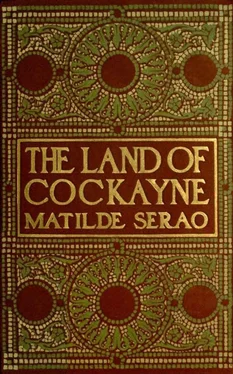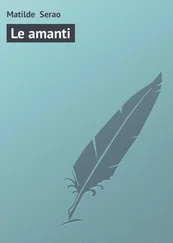Matilde Serao - The Land of Cockayne
Здесь есть возможность читать онлайн «Matilde Serao - The Land of Cockayne» — ознакомительный отрывок электронной книги совершенно бесплатно, а после прочтения отрывка купить полную версию. В некоторых случаях можно слушать аудио, скачать через торрент в формате fb2 и присутствует краткое содержание. Жанр: unrecognised, на английском языке. Описание произведения, (предисловие) а так же отзывы посетителей доступны на портале библиотеки ЛибКат.
- Название:The Land of Cockayne
- Автор:
- Жанр:
- Год:неизвестен
- ISBN:нет данных
- Рейтинг книги:3 / 5. Голосов: 1
-
Избранное:Добавить в избранное
- Отзывы:
-
Ваша оценка:
- 60
- 1
- 2
- 3
- 4
- 5
The Land of Cockayne: краткое содержание, описание и аннотация
Предлагаем к чтению аннотацию, описание, краткое содержание или предисловие (зависит от того, что написал сам автор книги «The Land of Cockayne»). Если вы не нашли необходимую информацию о книге — напишите в комментариях, мы постараемся отыскать её.
The Land of Cockayne — читать онлайн ознакомительный отрывок
Ниже представлен текст книги, разбитый по страницам. Система сохранения места последней прочитанной страницы, позволяет с удобством читать онлайн бесплатно книгу «The Land of Cockayne», без необходимости каждый раз заново искать на чём Вы остановились. Поставьте закладку, и сможете в любой момент перейти на страницу, на которой закончили чтение.
Интервал:
Закладка:
'Is nothing more needed?' she asked, rather thinking she had too few ornaments.
'No,' said the hair-dresser decisively; 'the fewer things put in the hair, the better.'
'Do you think so?'
'Let yourself be guided by one who knows his trade,' the artist added, gathering up his combs and curling-irons.
'You look very nice,' the husband whispered, on an inquiring glance from his wife. He looked at her tenderly, carefully, to see if anything was wanting. 'If my combination comes off,' Cesare added, whilst the barber took leave silently, so as not to waken the baby, after getting five francs and one more as a tip—'if my combination comes off, Luisella, I will buy you a string of diamonds for your neck.'
'What combination are you speaking of?' she asked, as she put some powder on her bare arms. She frowned, with a woman's sudden suspicion of all affairs she does not know about.
'I will tell you afterwards,' he said, stammering.
'Tell me now,' she demanded, standing with her long gloves in her hand.
'There is nothing really yet to tell, Luisella,' he said, rather put out at having let out something.
'Promise me never to decide on anything without asking me first,' she said, raising one hand.
'I promise,' he said with deep sincerity.
She was appeased, and sat down reassured, putting on her gloves, while her husband stood before the looking-glass twirling the points of his moustache, smiling at his own image and at life. The Fragalà family counted up no less than eighty years of commercial prudence and rising fortunes. Cesare's grandfather had begun with a wretched shop in Purgatorio ad Arco Street in the Pendino quarter, rather worse, said the envious, for he was a wandering salesman of cakes at a half-penny each, heaped on a wooden board carried on his head, under the arm, or by a leather band round the neck. In fact, either on the board or in that shop, these sweets were made of middling flour, sugar of third quality, eggs of doubtful freshness, and very often cooked in rancid lard, filled oftener with apples or quinces roasted under ashes than peach or black-cherry preserve. But what did it matter? All Southerners, men and women, young and old, love sweets, spicy cakes and biscuits sprinkled with aniseed and sugar; the pastry at a half-penny appeared and disappeared in Fragalà's shop, also sticky coloured caramels and cakes called ancinetti. Grandfather Fragalà soon managed, by dint of heaping up halfpence, to produce pastry at three-halfpence, the so-called sfogliatella, of which there are two qualities—the riccia, broad, thin, and flat, that falls into fine flakes, crackling under the teeth, whilst the cream in it melts on the tongue; and the frolla, thick and fat, two fingers' width of pastry that powders as you eat it, a thick layer of cream inside that covers your lips and jaws. It is true Grandfather Fragalà was accused of mixing a lot of dirty noxious ingredients in his sfogliatella: starch, gum, raw sugar, beef-fat, strong glue, and even bran. But what did it matter? On Sundays and all the other appointed feasts the sfogliatella sold like bread, or, rather, more so, from nine to two o'clock in the afternoon; then Fragalà shut his shop, because he had no more to sell, however many he had made, also because he was a God-fearing man. He quietly opened another shop in San Pietro a Maiella, putting in one of his sons; then, later on, another shop at Costantinopoli Street, towards the Bourbon Museum, with another son; and, finally, at his death, his eldest dared to aspire to Toledo Street, but in the upper part, opening a pastry-shop with three doors—that is to say, three shops—at the corner of Spirito Santo, a gorgeous place. The pastry-shops of Purgatoria ad Arco, San Pietro a Maiella, and Costantinopoli Streets still exist, owned by the younger brothers, all more or less black and dirty, full of buzzing flies, but giving out that intoxicating smell of burnt sugar, apples, fruit, and crumbling pastry that all Naples boys, women, and old men long for. Even at Purgatoria ad Arco the tarts were sold at a penny, halfway between grandfather's price and the three-halfpence of the modern shop. But the three shops in one in Toledo Street rejoiced in the inscription 'Founded in 1802,' in gold letters on black marble—it was all white marble, shining plate-glass windows full of coloured sweets, bright metal boxes, and clear glasses with biscuits, tall round vases of pastils, strong and sweet, for disordered stomachs or for coughs, and glass shelves with all kinds of pastry in rows. Via Toledo confectionery was superb, but among its innovations it had not neglected the safe old Neapolitan speciality, sfogliatella, always popular and long-lived, in spite of innovations in sweetmeats, in its two forms of riccia and frolla; on Sundays, all the patriarchal families that come out from Mass from so many churches round—Spirito Santo, Pellegrini, San Michele, San Domenico Soriano—bought in passing some six or eight sfogliatella, to give the final festive touch to the Sunday dinner. Cesare Fragalà's father had added to the sfogliatella all the other specialities in sweets eaten by Naples folk at all the feasts in the year: almond or royal paste at Christmas; sanguinaccio at Carnival; Lenten biscuits, the mastacciolo and pastiera, at Easter; l'osso di morto (dead men's bones), made of almonds and candied sugar, for All Souls' Day; the torrone for St. Martin's; and others—croccante, struffoli, sosamiello—all Parthenope's sweets, made of almonds, sugar, and chocolate, delightful to the palate and heavy to digest; but they are the joy of Naples crowds—they are sent into the provinces, every holiday, in all sizes of boxes by the waggon-load. Still among the Fragalàs' jealous rivals there were some whispers about the mysterious ingredients in these sweets; but it was harmless malignity, to which customers paid no heed; even if they believed it, they cared little about it. The Naples philosopher, Peppino, Fragalà's customer, said: 'If one knew what one was eating, no one would wish to eat anything.' The Fragalà house was solid: Cesare had inherited a good fortune and unbroken credit from his father.
It is true he had, as a rich citizen, an instinctive contempt for his uncles' and cousins' dark shops, where the flies buzzed annoyingly, as if cloyed and ill with indigestion from the bad sugar and honey; but he was prudent too—he did not scorn his origin, he willingly received his relations at family dinners, and when he had to make changes in his Toledo shop, he thought them over, and took advice—mostly from his wife. Luisa thought of all this as she put on her gloves slowly, whilst her husband went to the kitchen to see if the refreshments were ready, and that the extra servants, hired for the occasion, were properly dressed. She rose, and, picking up her yellow train, went to lift the lace curtain of the cradle, and passionately gazed on her daughter Agnesina. Never, never would her husband do anything without consulting her; he had married her for love, without a half-penny, against everyone's wishes, and he treated her like a lady, as if she had brought twenty thousand ducats as a dowry. Now that there was Agnesina too, father's lovely daughter, as he said playfully, it was impossible he would ever hide anything from her, his child's mother. Who knows? Perhaps it had to do with the pastry-shop in San Ferdinando Piazza, in the centre of the richest part of Naples, quite a modern shop, that Cesare had been dreaming about opening for some time past without daring to risk so much capital. Perhaps if was that, and the fresh, pleasant-faced mother blessed the little one, and prayed God would bless her father's plans and her mother's hopes.
On leaving the room she met her husband.
'Where is nurse?' she asked.
'In the room next the kitchen with Donna Candida.'
Читать дальшеИнтервал:
Закладка:
Похожие книги на «The Land of Cockayne»
Представляем Вашему вниманию похожие книги на «The Land of Cockayne» списком для выбора. Мы отобрали схожую по названию и смыслу литературу в надежде предоставить читателям больше вариантов отыскать новые, интересные, ещё непрочитанные произведения.
Обсуждение, отзывы о книге «The Land of Cockayne» и просто собственные мнения читателей. Оставьте ваши комментарии, напишите, что Вы думаете о произведении, его смысле или главных героях. Укажите что конкретно понравилось, а что нет, и почему Вы так считаете.












